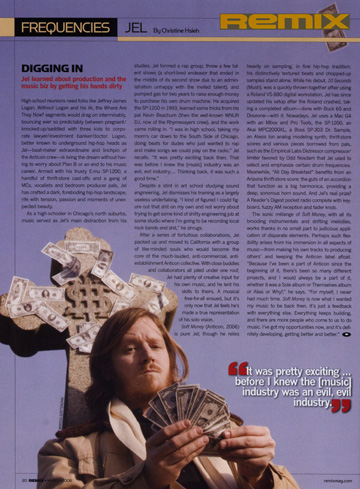
JEL LEARNED ABOUT PRODUCTION AND THE MUSIC BIZ BY GETTING HIS HANDS DIRTY.
High school reunions need folks like Jeffery James Logan. Without Logan and his ilk, the Where Are They Now? segments would drag on interminably, bouncing ever so predictably between pregnant/knocked-up/saddled with three kids to corporate lawyer/investment banker/doctor. Logan, better know to underground hip-hop heads as Jel--beat-maker extraordinaire and linchpin of the Anticon crew--is living the dream without having to worry about Pla B or an end to his music career. Armed with this trusty E-mu SP-1200, a handful of thrift-store cast-offs and a gang of MCs, vocalists and bedroom producer pals, Jel has crafted a dark, foreboding hip-hop landscape, rife with tension, passion and moments of unexpected beauty.
As a high-schooler in Chicago's north suburbs, music served as Jel's main distraction from his studies. Jel formed a rap group, threw a few talent shows (a short-lived endeavor that ended in the middle of its second show due to an administration unhappy with the invited talent), and pumped gas for two years to raise enough money to purchase his own drum machine.
He acquired the SP-1200 in 1993, learned some tricks from his pal, Kevin Beachum (the then well-known WNUR DJ, now of the Rhymesayers crew), and the work came rolling in. "I was in High School, taking my mom's car down to the South Side of Chicago, doing beats for dudes who just wanted to rap and make songs we could play on the radio," Jel recalls. "It was pretty exciting back then. That was before I knew the [music] industry was an evil, evil industry...Thinking back, it was such a good time."
Despite a stint in art school studying sound engineering, Jel dismisses his training as a largely useless undertaking. "I kind of figured I could figure that shit out on my own and not worry about trying to get some kind of shitty engineering job at some studio where I'm going to be recording local rock bands and shit," he shrugs.
After a series of fortuitous collaborations, Jel packed up and moved to California with a group of like-minded souls who would become the core of the much-lauded, anti-commercial, anti-establishment Anticon collective. With close buddies and collaborators piled under one roof, Jel had plenty of creative input for his own music, and he lent his skills to theirs. A musical free-for-all ensued, but it's only now that Jel feels he's made a true representation of his solo vision.
Soft Money (Anticon, 2006) is pure Jell; though he relies heavily on sampling, in fine hip-hop tradition, his distinctively textures beats and chopped-up samples stand alone. While his debut, 10 Seconds (Mush), was a quickly thrown-together affair using a Roland VS-880 digital workstation, Jel has since updated his setup after the Roland crashed, taking a completed album--done with Buck 65 and Doseone--with it. Nowadays, Jel uses a Mac G4 with an Mbox and Pro Tools, the SP-1200, an Akai MPC2000XL, A Boss SP-303 Dr. Sample, an Alesis lon analog modeling synth, thrift-store scores and various pieces borrowed from pals, such as the Empirical Labs Distressor compressor/limiter favored by Odd Nosdam that Jel used to select and emphasize certain drum frequencies. Meanwhile, "All Day Breakfast" benefits from an Arizona thrift-store score: the guts of an accordion that function as a big harmonica, providing a deep, sonorous horn sound. And Jel's real prize? A Reader's Digest pocket radio complete with keyboard, fuzzy AM reception and fader knob.
The sonic mélange of Soft Money, with all its brooding instrumentals and drifting melodies, works thanks in no small part to judicious application of disparate emelents. Perhaps such flexibility arises from his immersion in all aspects of music--from making his own tracks to producing others' and keeping the Anticon label afloat. "Because I've been a part of Anticon since the beginning of it, there's been so many different projects, and I would always be a part ofit, whether it was a Sole album or Themselves album or Alias or Why?." he says. "For myself, I never had much time. Soft Money is now what I wanted my music to be back then. It's just a feedback with everything else. Everything keeps building, and there are more people who come to us to do music. I've got my opportunities now, and it's definitely developing, getting better and better."
CHRISTINE HSIEH